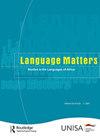Objection Overruled: Language Dynamics and Power Relations in Courtroom Interactions
IF 0.8
3区 文学
0 LANGUAGE & LINGUISTICS
引用次数: 3
Abstract
Abstract This article adopts a qualitative approach to examine language dynamics and power relations in interactions among participants in High Court proceedings in Calabar, southern Nigeria. The study utilises insights from speech act theory and the theory of language and power to account for the way in which institutional linguistic choices depict social roles, conveyed through speech acts that enact unequal power relations in the courtroom context. Data were generated during a year of fieldwork, through observation, note taking, and reading of legal proceedings in law chambers. The findings show the patterned linguistic peculiarities that characterise the interactions between participants (judges, counsel, litigants, witnesses, interpreters, and audiences) in the courtroom setting. The interactions instantiate a structured discourse pattern that appropriates discourse roles, discourse control, turn-taking, and talk domination as power devices. These discourse practices index asymmetry in power relations between participants and situate the courtroom as a site with institutionalised idiosyncrasies for power rehearsal.驳回异议:法庭互动中的语言动态和权力关系
摘要本文采用定性方法来研究尼日利亚南部卡拉巴尔高等法院诉讼参与者之间互动中的语言动态和权力关系。该研究利用言语行为理论以及语言和权力理论的见解来解释制度语言选择描述社会角色的方式,通过在法庭环境中建立不平等权力关系的言语行为来传达。数据是在一年的实地调查中通过观察、笔记和阅读律师事务所的法律程序生成的。研究结果显示了参与者(法官、律师、诉讼当事人、证人、口译员和观众)在法庭环境中互动的模式语言特点。互动体现了一种结构化的话语模式,将话语角色、话语控制、转向和话语支配作为权力手段。这些话语实践表明参与者之间的权力关系不对称,并将法庭定位为一个具有制度化权力排练特质的场所。
本文章由计算机程序翻译,如有差异,请以英文原文为准。
求助全文
约1分钟内获得全文
求助全文
来源期刊

Language Matters
Multiple-
CiteScore
1.20
自引率
0.00%
发文量
19
期刊介绍:
The purpose of Language Matters is to provide a journal of international standing with a unique African flavour focusing on multilingualism in Africa. Although the journal contributes to the language debate on all African languages, sub-Saharan Africa and issues related to multilingualism in the southern African context are the journal’s specific domains. The journal seeks to promote the dissemination of ideas, points of view, teaching strategies and research on different aspects of African languages, providing a forum for discussion on the whole spectrum of language usage and debate in Africa. The journal endorses a multidisciplinary approach to the study of language and welcomes contributions not only from sociolinguists, psycholinguists and the like, but also from educationalists, language practitioners, computer analysts, engineers or scholars with a genuine interest in and contribution to the study of language. All contributions are critically reviewed by at least two referees. Although the general focus remains on multilingualism and related issues, one of the three issues of Language Matters published each year is a special thematic edition on Language Politics in Africa. These special issues embrace a wide spectrum of language matters of current relevance in Southern Africa.
 求助内容:
求助内容: 应助结果提醒方式:
应助结果提醒方式:


